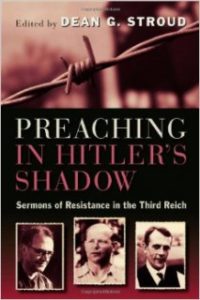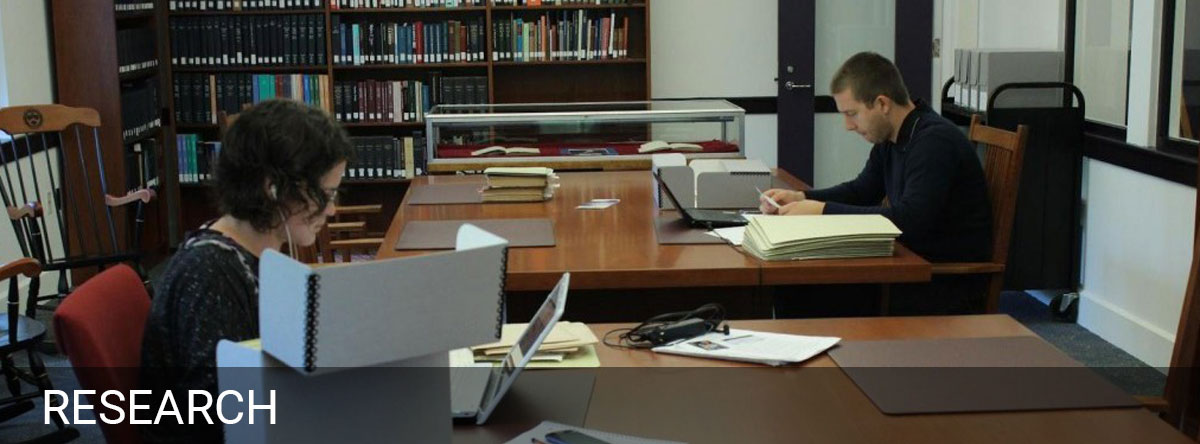 Stroud, Dean G. ed. Preaching in Hitler’s Shadow: Sermons of Resistance in the Third Reich (Grand Rapids, MI: Eerdmans, 2013), 215 pp. $20.00 (paperback).
Stroud, Dean G. ed. Preaching in Hitler’s Shadow: Sermons of Resistance in the Third Reich (Grand Rapids, MI: Eerdmans, 2013), 215 pp. $20.00 (paperback).
Reviewed by David Stark (January 04, 2017)
Preaching in Hitler’s Shadow presents a collection of twelve sermons set within historical context. Dean Stroud, a former Presbyterian pastor and professor emeritus of German Studies at the University of Wisconsin, LaCrosse, seeks to give readers access to some primary sources from a significant few who resisted the Third Reich in their preaching. The sermons are drawn from 1933 to 1944 and arranged chronologically. These sermons take several forms: topical, occasional, expositional, single-verse meditation, and multi-text theological refection. Four of the twelve sermons are based on Old Testament texts. Well-known figures like Karl Barth, Dietrich Bonhoeffer, and Martin Niemöller are included, but many lesser known preachers like Gerhard Ebeling and Julius Van Jan offer homilies to which Stroud rightly draws attention.
The sermons are presented so that readers can “draw their own conclusions about Christian opposition to Hitler” (x). As such, this work is not meant as an apologia for the church. “Without a doubt,” Stroud acknowledges, “the church as a social and political institution failed the test of confronting Nazism” (4). Most pastors did not offer significant resistance—a point Stroud underscores by including an appendix with the German Christian sermon supporting the loyalty oath to Hitler.
Stroud sets this collection of sermons in historical context by offering brief introductions to each sermon and by providing a 45 page overview of Nazi Germany (following Paul von Hindenburg’s appointment of Hitler as Chancellor). Obviously, with such limited space, Stroud can only offer a basic primer. Still, this section manages to provide enough guidance that those who have not studied this period in history will be able to appreciate many of the nuances and subtleties within the sermons. Particularly helpful is Stroud’s attention to the political, rhetorical, and theological aspects of the rise of the Third Reich. Politically, Stroud highlights Point 24 of the Nazi platform of the 1920s, discusses the impact of the Nuremberg Laws, traces the horrors of the Kristallnacht pogrom, and emphasizes the misuse and manipulation of “blood,” “state,” and “Volk.” Theologically, Stroud discusses the development of an Aryan Jesus, the Nazi refusal to admit sin, the elevation of Hitler as an object of faith, and the rise of the nationalistic and anti-semitic German Christian movement. He also highlights significant responses from Karl Barth, Dietrich Bonhoeffer, and Martin Niemöller through the Barmen Declaration, the underground seminary at Finkenwalde, the Pastor’s Emergency League, and the Confessing Church. Rhetorically, Stroud discusses the impact of Nazi rhetoric. This includes the use of euphemisms and the manipulation of language as noted above. It also includes an analysis of superlatives used by Nazis to describe themselves (i.e. “smartest,” bravest”) and their political threats (i.e. “worst,” most dangerous”) (43). Furthermore, as Stroud notes, Hitler and Goebbels consistently used pejorative adjectives when referring to targets like the Jews (15).
Stroud believes that these rhetorical and theological observations become especially important for understanding the ways that preachers sought to counter Nazism. He is surely right, but it should be noted that the book does not develop this argument. Rather, Stroud simply highlights seven themes of opposition: “the authority of Jesus Christ; the sovereignty of God; both the Old and New Testaments as Holy Scripture; the purity of the church; the certainty of God’s judgment on Germany for immorality and for the failure to love the neighbor, especially the Jewish brother and sister; the relevance of the gospel after the European Enlightenment and in spite of Nazi pseudoscience and paganism; and the gospel’s insistence that Christians must risk even their lives for the truth of Christianity” (48). Any conclusions about the use of these themes in sermons or their effectiveness as a response to the Nazi agenda are left to the reader’s discernment.
While some readers will appreciate this interpretative freedom, others will wish that Stroud had offered more of a scholarly presence. This longing extends to other areas of the book as well. For instance, Stroud makes extensive use of Wikipedia as a source for contextual details, and he does not always define concepts with enough nuance. This latter point is especially felt in his reflections on politics and preaching. Here the study would have benefitted from distinguishing between apolitical interpretation (e.g. of the zweite Reiche) and political application in Nazi Germany. So too Stroud struggles to distinguish political intention from practical effect. He observes, on the one hand, that the Barmen Declaration “declared that Jesus Christ alone had claim to a Christian’s entire existence and thus rejected the notion that there were other ‘areas’ of life in which Christians had ‘other lords’” (41). Yet, on the other hand, Stroud asserts that the Declaration “was a statement of Christian faith and not a political agenda” (41).
In his treatment of Karl Barth, Stroud offers a mixed witness. At times his treatment approaches hagiography: “The influence of Barth, and others who agreed with him on his approach to homiletics, would be hard to overemphasize” (35). At other times Stroud offers a more rational assessment of some of Barth’s important works. He notes that Barth’s commentary on Romans, “challenged readers to hear the epistle as God’s word directly addressing the present moment” and held that a human kingdom is “without exception, never the kingdom of God” (31). Barth’s lectures on Homiletics, Stroud asserts, call for the text to control the sermon and point to Jesus Christ as the word of God in holy scripture (33). Stroud observes that Barth wrote the first draft of the Barmen Declaration with the intention of combating German Christian claims that someone other than Jesus could be lord (40).
Beyond the introductory section, however, Stroud offers surprisingly little detail about Barth’s preaching or influence. Stroud includes only one of Barth’s sermons. By comparison, both Paul Schneider and Helmut Gollwitzer have two sermons each in this collection. And, while Barth’s sermon on Jesus as a Jew is equally profound in its Christology and troubling in its implications for modern Jews, Stroud offers little more reflection than a few footnotes. Stroud might have asked: Why does Barth say Jesus “was” (rather than “is”) a Jew? How does Barth understand the on-going presence of Jews to affect Christian existential reflection?
Perhaps these kinds of questions are the ones that Stroud wants to elicit in the reader rather than answer himself. Perhaps Stroud intends simply to pass along important primary sources that lead the reader to an experience of resistance preaching:
“Worse than the rising cost of food for a people is the rising cost of God’s word…But it is always the nation and its people who are to blame when such an expensive time hearing God’s word comes. Certainly we too have brought this period of the church’s crisis in Germany upon ourselves” (Paul Schneider 101-2).
“Here we see the price we are paying for the great falling away from God…houses of God that were sacred to others have been burned to the ground, property belonging to the foreigner plundered or destroyed, men who faithfully served our nation and who fulfilled their duty in good conscience have been thrown into concentration camps simply because they belong to another race, and all this without anyone being held accountable!” (Julius von Jan, 112).
“The unwillingness to repent destroys the bridge leading to your neighbor. Repentance rebuilds this bridge” (Helmut Gollwitzer, 124).
Indeed, the strength of this work is that it presents sermons from the 1930’s and 1940’s as words that are “as ‘preachable’ today as they were then” (x). Perhaps they are a little more preachable in 2017 than one would like, but such an observation only underscores the important contribution Dean Stroud has offered to scholars and preachers today.
David Stark, Th.D. Candidate, Duke Divinity School
The views expressed here are strictly those of the author; they do not necessarily represent the views of the Center for Barth Studies or Princeton Theological Seminary.


